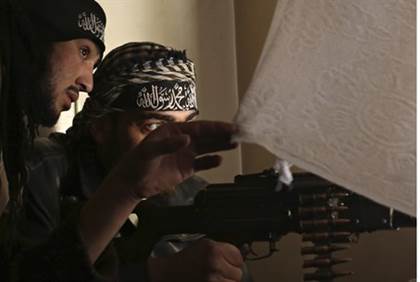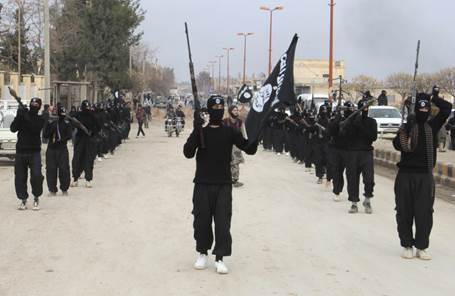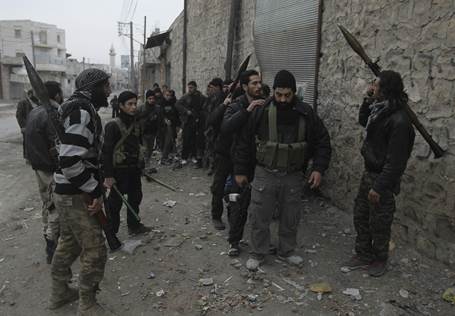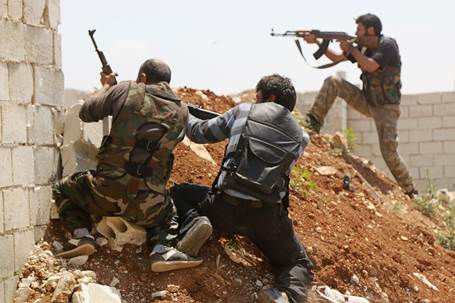WHO ARE THE SYRIAN REBELS? ARE THEY A THREAT TO ISRAEL?
by Ari Soffer

Last week's indictment[1] of an Israeli Arab man returning from Syria, where he had enlisted as a fighter for the jihadist Islamic State of Iraq and the Levant (ISIS), should come as no surprise.
23-year-old Ahmed Amad Hiri Shurbaji is only the latest case of a slowly growing number of young Israeli Arabs leaving to fight for the rebels in Syria's bloody civil war, which is now dragging on into its fourth year with no end in sight. He is, however, the first Israeli citizen confirmed to have fought among the ranks of ISIS — a faction whose tactics are so brutal it was disowned by Al Qaeda's official leadership as a liability.
Israeli security services and intelligence agencies have been following the phenomenon with understandable concern, much like their counterparts in the west, where thousands of Islamists have left to join the ranks of rebel groups, including ISIS. Among the Syrian opposition forces are a range of avowedly anti-western and anti-Israel Islamist groups, and the fear is that Israeli Arabs who go to fight alongside them could one day return (as Shurbaji did) — battle-hardened and radicalized — to pose a genuine threat to Israel's security.
It is that fear — as well as the possible future scenario of a jihadi-run state along Israel's northern border — which has prompted some Israeli commentators to opine that a victory for Assad might be the lesser of two evils.[2]
But other experts — both Israeli and otherwise, disagree. Moreover, despite the presence in Syria of a vast array of jihadis supposedly committed to Israel's destruction, Israel's northern border has remained largely quiet. When that quiet has been broken, it is often the result of accidental fire or rogue attacks by squads of pro-regime fighters, as opposed to deliberate attacks by Islamist rebels.
So who are the Syrian rebels, and do they really pose a threat to the Jewish state?
Who are the rebels?
That first question is itself a difficult one to answer.
There are believed to be somewhere in the region of 1,000 armed opposition groups operating on the ground in Syria, fielding some 110,000 fighters between them.
Although the Syrian opposition is primarily comprised of Sunni Muslims (Syria's majority population), rebel battalions are far from ideologically homogeneous. They range from Al Qaeda to the Muslim Brotherhood, and from privately-funded Salafist brigades to groups still ostensibly committed to a secular Syrian state, in one form or another, the day after Assad. That diversity is also reflected in (and often the direct result of) the respective groups' links to state and non-state actors outside of Syria — including Saudi Arabia, Qatar, Turkey, western states and independent donors located largely in the gulf states.
But according to Aymenn Al-Tamimi, an expert on Syrian affairs and Fellow of the Middle East Forum, the Syrian rebels can be roughly broken down into five main actors — coalitions formed out of a mixture of strategic necessity, ideological kinship and, sometimes, shared sponsors.
The Islamic State of Iraq and the Levant — ISIS
The first is ISIS. Despite being one of the smallest of the five main rebel factions (estimates range from 5,000-10,000 fighters), it is fast emerging as the most effective, and has come to be feared as a ruthless fighting force. More importantly, ISIS controls the largest contiguous swathe of territory of any opposition faction.
The key to ISIS's success in holding territory where other rebel groups have failed lies in its self-image as a state-actor, which drives its ruthlessly efficient campaign to monopolize control of regions in which it is present.
"They call themselves an Islamic state and they consider themselves an Islamic state, so in the long run they're never going to be amenable to power-sharing with other groups," says Tamimi.
"If you were to ask who were the main actors in Syria apart from the rebels I'd say the regime, the Kurds and ISIS, because the amount of territory that ISIS controls is more contiguous territory than any opposition actor," he offers. "In terms of territory, other rebels groups just don't compare with it."
ISIS is also thought to contain the largest proportion of foreign fighters, hailing from countries across the globe, including a large contingent of non-Arab fighters from the west and the Russian Caucuses.
Led by Iraqi-born Abu Bakr al-Baghdadi, ISIS started as the Islamic State of Iraq, Al Qaeda's official affiliate in that country. But the ambitious al-Baghdadi has since fallen out of favor[3] with Al Qaeda's leadership, headed by Osama bin Laden's former deputy Ayman al-Zawahiri, when he entered the fray in Syria independent of Al Qaeda's official Syrian branch (the Nusra Front), and then publicly rejected Zawahiri's calls to withdraw.

Perhaps just as critical to Zawahiri's disillusionment with ISIS is the group's notoriously brutal tactics both on the battlefield and against civilians, as it consolidates its control over large portions of northern Syria and imposes a strict interpretation of Islamic law (Sharia). ISIS's cruelty threatened to turn ordinary Syrians against it (and indeed it now has an uprising of sorts on its own hands), motivating Al Qaeda's central leadership to disown it. More than anything else, that was an attempt to avoid a repeat of the group's experience in Iraq, where, under the leadership of Baghdadi's thuggish predecessor Abu Musab al-Zarqawi, an uprising by Sunni tribesmen outraged at his brutality brought Al Qaeda to the edge of defeat.
But Al Qaeda in Iraq eventually regained momentum[4] — which it took into Syria, becoming the Islamic State of Iraq and "al-Sham" (Arabic for the Levant, or Greater Syria).
Regarding Israel, ISIS's ambitions "are very clear," notes Tamimi. Under its vision of an Islamic Middle East "the land of Israel would be incorporated as part of Greater Syria," as it once was considered during its time under Muslim occupation.
And ISIS has been very open about its intentions; in areas under its control, the group has erected billboards saying 'our eyes are on Al Quds (Jerusalem)'.
The Nusra Front
It is an outlook shared by the the second major rebel actor, Al Qaeda's official Syrian branch Jabhat Al Nusra (the Nusra Front). Its leader, Syrian-born Abu Mohammed al-Jawlani ("the Golani"), is recognized as Al Qaeda's official emissary in Syria. Like ISIS, its leaders have made clear that once they manage to overthrow the Assad regime, they will turn their guns on Israel.
It is the smallest of all five major factions, with around 6,000 fighters — but like ISIS it has a reputation as a fierce and effective fighting force. Its leadership is dominated less by foreign jihadis, but foreign fighters still comprise a significant minority of its rank and file.
However, unlike ISIS — with whom it has a strained, sometimes even overtly hostile relationship — its forces have been unable to establish exclusive control over territory in Syria.
"The majority of places where they are present they are sharing power with other factions," according to Tamimi.
"They are very few places you could actually identify as Nusra strongholds in terms of who has exclusive control over territory," he added, although the group does have a monopoly over local Islamic courts, or Shura Councils, in some areas.
The Islamic Front
The third and largest faction is the Islamic Front[5] — an alliance of Islamist brigades ranging from the radical Ahrar al-Sham, elements of which are sympathetic to Al Qaeda, to Muslim Brotherhood-aligned factions and "independent" jihadist groups. Although it has not established a contiguous band of territory under its control, the Islamic Front operates "pretty much everywhere where ISIS does not have exclusive control," according to Tamimi. Precise number of fighters are hard to come by, but by the end of last year it was estimated to have at least 45,000 men under its command.
Although not officially associated with Al Qaeda, and while playing an active part in fighting against ISIS, Islamic Front brigades often fight side-by-side with the Nusra Front, and have made no secret of their own hostile intentions towards Israel.
In October of last year for example, the Army of Islam (Jaysh al-Islam), which is the main Islamic Front faction in the Damascus area, launched a scathing critique of Hamas,[6] both for its ties to Iran and hesitancy to support its Sunni coreligionists in Syria, as well as for its perceived unwillingness to confront Israel.

"Their attitude (towards Israel) is again the same," says Tamimi, pointing out that in their criticism of Hamas, the Army of Islam quoted notorious Arab-Israeli Islamist Raed Salah as saying that "liberating Al Aqsa Mosque begins by liberating Damascus." It is notable that many Arab Israelis who have gone to fight in Syria were associated with Salah's Islamic Movement.
All Islamic Front factions "agree on that point: they don't want Israel to exist in any form, there's no doubt about that."
The Free Syrian Army
It will come as little surprise that Islamist factions, from Al Qaeda to the Muslim Brotherhood, have less-than-friendly intentions towards the Jewish state. But what of the much-vaunted "moderate Syrian opposition", commonly referred to more generally as the "Free Syrian Army" (FSA), which western states have been providing with limited support and training?
The two remaining major rebel factions — the Supreme Military Council (SMC) and the Syrian Revolutionary Front (SRF)[7] — both fall under that category, fighting as they do under the flag of the FSA. Once the only major rebel group, led by Syrian army defectors, the FSA has since been eclipsed by the Islamic Front after floundering as a result of ineffective leadership,[8] infighting and, some argue, broken promises of support from western states.

"The only ambiguity you are likely to get [regarding Israel] is from certain people within some of these SMC and other FSA groups, who might for example express some gratitude[9] that Israel provides medical treatment for injured Syrians," and in some isolated cases even cautiously declare their willingness to one day engage with Israel should they take power, says Tamimi.
Both are concentrated largely in the south of Syria, including along the border with Israel, where they have witnessed firsthand the IDF-operated field hospitals which belie anti-Israel stereotypes by providing medical treatment to injured Syrians regardless of their background.
But despite the simplistic tendency of some observers to classify them as the "moderate" or "secular" face of the Syrian rebel movement, the reality is more complex, as both coalitions are made up of a mixture of secular and more Islamist brigades. Moreover, their number one concern is success against the Assad regime, and FSA battalions have often proved willing to join forces with more radical factions when necessary.
A glaring illustration of this reality[10] came last month, when the leader of the SRF, Jamal Maarouf, made it clear in a rare interview that his group often fought alongside, and even shared weapons and equipment with, the Nusra Front.
"It's clear that I'm not fighting against Al Qaeda... This is a problem outside of Syria's border, so it's not our problem. I don't have a problem with anyone who fights against the regime inside Syria," he told The Independent, adding that his only "problem" was with the widely-despised ISIS.
And Tamimi cautions that even for the few lone voices calling for rapprochement with Israel, a withdrawal from the Golan Heights — which Israel conquered in the 1967 Six Day War — would not be negotiable.
"The fact is that for the overwhelming majority, at a very minimum the Golan Heights issue is something very emotional for them," concludes Tamimi.
A genuine threat?
On paper, then, the picture looks rather grim.
Indeed, Tamimi warns against whispers of a potential alliance between Israel and some rebel brigades against the Iranian-backed Assad, saying such an adventure was simply unrealistic.
"The only thing Israel can do is take precautionary measure to try to prevent a spillover, and retaliate appropriately if anything does come from Syria," he says. "The current cautiousness they are pursuing now is really the only policy that can be implemented — they definitely shouldn't take sides."
And the decision to open field hospitals to provide treatment for injured Syrians is also a "sensible policy", insofar as it is having some success in "changing perceptions of Israel for ordinary Syrians."

But that success is clearly limited, as only a "very small minority" of Syrians have had such contact with the IDF. The majority of Syrians still "hate Israel," as is evident in the fact that both sides of the conflict regularly use allegations of cooperation with Israel or "the Zionists" as an insult or an attempt to discredit their opponents.
Even if they were able to overcome their own ideological problems with such an alliance, rebel groups who allied with Israel at this point would risk losing support both on the Arab street and from many of their Islamist sponsors.
Who's the 'big satan'?
According to Tamimi, one of the main reasons radical rebel factions have not attacked the hated "Zionists" is the same one behind Assad's hesitancy to retaliate against Israeli strikes on weapons shipments to Hezbollah: it just isn't in their interest right now. Both sides are engaged in a life-or-death struggle, and cannot spare any time or resources fighting Israel.
Ideologically as well, something has changed within the Sunni world which largely backs the rebels. It is most evident in the way it has turned against Hezbollah: once a beloved icon of "resistance" against Israel which transcended sectarian religious allegiances, the Lebanese terrorist group is widely referred to now as "Hizb-ul-Shaytan" (Party of Satan — a play on its actual name which means "Party of God") by many Sunnis. It reflects the fierce hatred with which they view the group which has played a brutal and crucial role in several regime victories, particularly in the country's mountainous western border with Lebanon.
And that recent hatred has helped reignite a centuries-old struggle for control within Islam.
Islamist rebels now "see them [Israel and the Iranian-Shia axis] as equal enemies — but the Shia are seen as a more immediate threat, because they [Sunnis] keep saying that if they are victorious in Syria they'll come for the holy sites in [Sunni-controlled] Mecca and Medina next."
It is a claim repeated specifically by ISIS and Al Nusra. For its part Hezbollah claims the opposite — that its fighters were simply enlisted to protect Shia shrines under threat from puritan Sunni Islamists who view them as idolatry.
It is also worth noting that despite its clear hostility towards Israel, the largest rebel grouping (the Islamic Front) was founded in part as a way of refocusing the Syrian revolution inwards, at a time where both Al Qaeda factions and the western-aligned SMC were seen as serving outside interests.
The Syrian people "want a revolution and not politics and foreign agendas", an Islamic Front commander told Al Jazeera shortly after the alliance was founded.
There are other, more geostrategic reasons for the absence of hostilities.
The most aggressive faction, ISIS, is based in northern Syria, nowhere near Israel, and Nusra and Islamic Front strongholds are also some way from Israel's border. The FSA factions who control much of southern Syria, even if not friendly to Israel, have no ideological motivation to engage in "jihad" against it at all cost.
Threat still real
So should we feel safe? Not necessarily.
Despite the above, Tamimi points to the ever-ambitious and hyper-jihadi ISIS as the "number one" group to watch, due to its potential capacity to strike outside of Syria.
The handful of major attacks by rebel actors outside Syria have tended to be strikes against Hezbollah strongholds in Lebanon carried out either by the Nusra Front or other groups loyal to Al Qaeda's central leadership. But ISIS has shown an increasing propensity of its own to do so as well. Apart from its regular bloody attacks in Iraq, ISIS has carried out numerous mortar and rocket strikes into Lebanon and in January of this year claimed its first suicide bombing there, killing four people and wounding nearly 80 in an attack in Beirut.
And unlike the Nusra Front, it is less hamstrung in terms of resources. Its capacity to hold territory, specifically in Iraq's oil-rich north, has provided it with a rich source of funding via extortion rings and limited black-market sales of oil and natural gas — a handy way of offsetting its shrinking pool of increasingly disillusioned private donors.
But most important is ISIS's links to radical Islamist factions — inspired by Al Qaeda, but not necessarily linked to its central leadership — operating along Israel's southern border.
"ISIS is the one you have to look out for because there are clear links between them and jihadists in Gaza," as well as Sinai-based groups such as Ansar Bayt al-Maqdis, which has carried out several attacks against Israel.
"I just don't think Nusra have the same capabilities. The key issue which distinguishes between ISIS and Nusra in this regard is the support ISIS have in areas on the border with Israel."
There is even a Gazan contingent operating within ISIS's ranks on the ground in Syria.
"Who's to say they won't come back one day and carry out attacks?"
But like most other Syria analysts Tamimi does not foresee a radical shift in the status quo within Syria any time soon. That is particularly true now, as rebels focus on pushing back against the regime following a series of defeats[11] throughout the country in the past few months — which, significantly, have been largely blamed on the diversion of precious resources away from the front during ongoing rebel infighting.
But whether or not they are successful in turning the tide back in their favor, neither the rebels nor the regime are unlikely to pursue as costly a diversion as a war with Israel in the foreseeable future.
"I don't see any faction emerging out on top even within the next few years," Tamimi predicts.
"I think this fighting is going to go on for many, many more years."
Footnotes
[1] http://www.israelnationalnews.com/News/News.aspx/180613
[2] http://www.israelnationalnews.com/News/News.aspx/175039
[3] http://www.israelnationalnews.com/News/News.aspx/179284
[4] http://www.israelnationalnews.com/News/News.aspx/170197_mSyX8
[5] http://www.israelnationalnews.com/News/News.aspx/174393
[6] http://www.israelnationalnews.com/News/News.aspx/172923_mSyX8
[7] http://www.israelnationalnews.com/News/News.aspx/175251
[8] http://www.israelnationalnews.com/News/News.aspx/177549
[9] http://www.israelnationalnews.com/News/News.aspx/177741
[10] http://www.israelnationalnews.com/News/News.aspx/179200_mSyX8
[11] http://www.israelnationalnews.com/News/News.aspx/180382
Ari Soffer is a journalist and managing editor of Arutz-Sheva (Israel National News.com). This article appeared May 18, 2014 in Arutz-Sheva and is archived at http://www.israelnationalnews.com/News/News.aspx/180622#.U5oepHL8iJN.